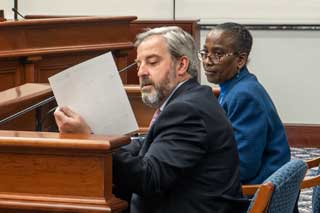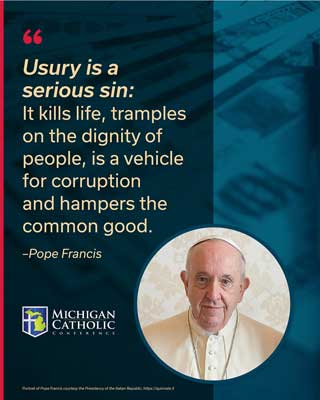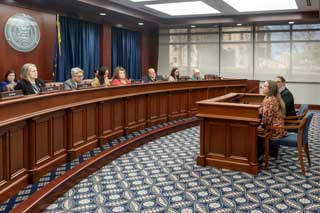Lansing Update: This Week in Capitol Advocacy: Protecting the Poor From Predatory Lending; Protecting Mothers Who Chose Adoption
Posted March 1, 2024
MCC Joins Broad Support to Protect Poor From Predatory Payday Loans
Michigan Catholic Conference (MCC) this week testified for legislation that places limits on high-interest, predatory payday loans in Michigan to protect the poor from getting caught in a long-term cycle of debt.
Senate Bill 632 would cap the annual percentage rate (APR) tied to a payday loan at 36%, which would protect customers who take out loans with interest rates that currently go as high as 391% and average around 370%.
Payday loans are marketed as a solution for people who need quick access to cash before their next paycheck. A customer can borrow up to $600 and typically must repay it by their next paycheck, plus a service fee. But the high cost of these loans coupled with the short timeframe makes it difficult for borrowers to repay them, which often leads to the borrower taking on more debt, such as another payday loan to pay off the previous one.
The data bear this out—70% of payday loan borrowers take out another loan the same day one is paid. Most payday loans are taken out by people in or near poverty, and payday lenders often target low-income neighborhoods for locating their storefronts.
During the hearing this week before the Senate Finance, Insurance, and Consumer Protection Committee, advocates for SB 632 shared a few personal stories about their experiences with payday loans. One story involved a woman who said she experienced homelessness and had to stop pursuing her degree due to the debt she took on from using payday loans. Another woman told the committee that her family almost lost their home when they chose to stop the spiral of taking out another payday loan to cover living expenses.
Both the bill sponsor, Sen. Sarah Anthony (D-Lansing), and the committee chair, Sen. Mary Cavanagh (D-Redford Twp.) said they’ve also had personal experiences with payday loans.

During his testimony, Tom Hickson, MCC vice president for public policy and advocacy, said there remain several lower-interest alternative lending programs that provide small-dollar loans to people who need access to cash. These alternatives are available from major banks, credit unions around the state, and local nonprofit and charitable organizations, including the St. Vincent de Paul Society.
In addition to MCC, other organizations that testified in support of a payday lending cap include the Community Economic Development Association of Michigan, Michigan Poverty Law Program, the Center for Responsible Lending, and Project Green, as well as the Michigan Department of Insurance and Financial Services, which serves as the state regulator of banking and insurance services.
MCC has been involved in advocacy around the payday lending issue for many years, particularly in efforts to oppose expansion of the industry and to support bills like these that seek to better protect the poor and vulnerable people who use these services from falling into larger financial problems.
Earlier this week, MCC issued an Action Alert to members of the Catholic Advocacy Network like you to get involved and contact your state senator to support SB 632. Catholic social teaching urges opposition to unjust business practices, as well as taking advantage of the poor and vulnerable, and both Pope Francis and Pope Benedict XVI have spoken out against usury, or lending at an unreasonably high interest rate.
We encourage you to send a quick message to your state senator to support the legislation by clicking or tapping here.

The committee this week also took testimony on another MCC-supported bill, House Bill 4343. The legislation, sponsored by Rep. Jennifer Conlin (D-Ann Arbor), would require the state to produce reports on payday lenders to help shed light on industry practices and help lawmakers and the public better understand the industry’s impact on the poor and vulnerable.
The data provided in these reports would include how many businesses are engaged in providing these loans and where these businesses are located, as well as how many customers are using these loans and how much in fees they are paying to access these loans.
House Bill 4343 previously cleared the House on a broad bipartisan vote of 97–12.
The committee took testimony only on the two bills this week.
Bill Breaking Confidentiality Promise for Parents Choosing Adoption Opposed by MCC
Mothers who were guaranteed confidentiality by the state when they agreed to have their children adopted would lose that right promised to them under legislation being considered in the Senate and opposed by MCC.
House Bills 5148 and 5149 would force the disclosure of a birth mother’s identity by requiring the release of the unredacted, original version of an adult adoptee’s birth certificate, even if the adoption was closed and the birth mother had requested confidentiality. This would apply retroactively to past adoptions and going forward would essentially end the now rarely used, yet still important option for birth parents to be able to choose to remain confidential given their specific circumstances.
MCC took a position of opposition on the legislation after consulting with Catholic Charities agencies in the state, which work to place children for adoption and facilitate post-adoption services, such as when birth parents or adopted children are seeking information about each other.
In a hearing before the Senate Civil Rights, Judiciary, and Public Safety Committee this week, lawmakers heard directly from Stephanie Busch of Catholic Charities of West Michigan, who has worked in the agency’s adoption services for the past 20 years and handles all the post-adoption work across the entire 11 counties of the Diocese of Grand Rapids.

Busch said adoptees can request and receive all the information in their file except for the identifying information of a birth parent. She said that any birth parent that has gone to court and consented to an adoption, or release of their parental rights, was told they have the right to restrict the access to their identifying information.
“We have a lot of … birth parents that have gone forward with that understanding that that was their right, and this would change that for them,” Busch told the committee.
Disclosing the identity of birth mothers in closed adoptions that happened many years ago could be problematic for people who may have gone on to get married and have children and never told anyone they had previously placed a child for adoption, Busch said, who also serves as a court-appointed confidential intermediary who is called upon to facilitate meetings between adoptees and birth parents when requested.
Closed adoptions—in which the birth parents and adoptees’ identities are not known to one another—are rare these days, and most adoptions are instead open. But in prior testimony before a House committee on this legislation, MCC shared with lawmakers there are still valid reasons why birth parents choose to remain anonymous, or why they chose to remain anonymous in the past.
In some instances, confidentiality is needed because there is concern for the mother’s safety, such as trying to avoid a violent domestic partner, or that the birth mother is the survivor of a sexual assault. For some birthparents, having an option for confidentiality is vital, and without it, they may otherwise not choose adoption.
Busch said the legislation also presents a few concerns regarding inequity, including that the original birth certificate of the adoptee always contains at least the birth mother’s name, but often not the birth father’s. That means the birth mother’s confidentiality would always be taken away under this legislation, while the birth father’s identity would remain hidden.
Currently in closed adoption cases, adoptees’ requests for contact can be fulfilled through an intermediary process that can allow birth parents to voluntarily agree to meet. Busch, in her work as a confidential intermediary, said she works to get the parties to a space where they may be comfortable to meet, which is a process.
By contrast, the legislation, allowing the release of the unredacted birth certificate to the adoptee, would remove the birth parent’s confidentiality and their ability to control the timing or manner of a first contact with their birth child.
While the legislation would allow for birth parents to complete a contact preference form, there is no enforcement or deterrent mechanism to prevent an adult adoptee from violating a preference of “No Contact.” Unwanted and unexpected contact could result in re-traumatization, emotional distress or even cause a mental health crisis for the birth mother.
Joining MCC in opposing the bills include a wide variety of organizations such as the American Civil Liberties Union (ACLU), Right to Life of Michigan, the Michigan Poverty Law Program, the Michigan Coalition to End Domestic and Sexual Violence, the Michigan Adoption Subcommittee of the Family Law Section of the State Bar, and the Michigan Domestic & Sexual Violence Prevention & Treatment Board.
The Senate committee took testimony only on House Bills 5148 and 5149 this week, which have already cleared the House and are sponsored by Reps. Kristin Grant (D-Grand Rapids) and Pat Outman (R-Six Lakes).
MCC Oppose Bills That Block Nonpublic Schools From Buying Unused School Buildings
MCC this week opposed legislation allowing public schools or local governments to block the sale of old public school buildings for reuse by charter or nonpublic schools, which would undermine the principle of school choice in Michigan.
House Bill 5025 would repeal a law enacted in 2017 that prohibited local governments or public schools from blocking the sale of property to charter schools or nonpublic schools. The law prohibited the refusal to sell or lease public school property, or from using deed restrictions, ordinances, or local policies to prevent selling or leasing to charter schools and nonpublic schools.
MCC supports the existing law with the idea that communities should not be precluded from selling old public school property to an entity that wants to maintain a school in that community.
Because the bill would block charter schools and nonpublic schools from the opportunity to purchase unused public school facilities to advance their educational missions, the legislation stands in opposition to promoting a society where families have ample choices in education.
The legislation, sponsored by Rep. Noah Arbit (D-West Bloomfield) received testimony only during a hearing before the House Education Committee this week.
Foster Care Education Bills Backed by MCC Signed Into Law
The Governor this week signed into law legislation to ensure foster children are provided with an education to meet high school graduation requirements.
The bills, which received wide bipartisan support in both chambers, require the state’s foster care policy to include the assurance that foster children are provided an education that prioritizes meeting the requirements for a high school diploma. They also require the state to review the education being offered in foster care facilities and to report publicly on the education provided to foster children.
MCC supported this legislation because it helps foster children, which aligns with MCC’s policy priority to improve foster care. The bills arose from reports that foster children had taken classes that didn’t count toward their graduation.
The bills signed into law, House Bills 4677 and 4678, were sponsored by Reps. Stephanie Young (D-Detroit) and Kimberly Edwards (D-Eastpointe).
Legislation to Improve Driver’s License Access Advances
An MCC-supported bill to promote access to driver’s licenses cleared a Senate committee this week.
House Bill 5103, sponsored by Rep. Donavan McKinney (D-Detroit), ends the three-year waiting period to receive a license for someone who had committed two or more moving violations when they were without a license.
The goal of the legislation is to ease access to acquiring a driver’s license for someone—particularly the youth—rather than delaying it for three years.
The legislation is now on the Senate floor where it awaits consideration.
Focus Friday: Learn About Catholic Agencies Dedicated to Finding Homes for Kids
Both adoption and foster care have been legislative items of interest lately in Lansing Update emails, as well as the work done by the state’s Catholic Charities agencies to place children for adoption.
Caring for orphans and children impacted by difficult situations is emphasized in Catholic teaching, and adoption and foster care are core services that Catholic Charities provide the communities they serve, in addition to caring for the poor and needy and conducting other works of mercy.
With that in mind, this week’s Focus Friday is a good opportunity to further explore the crucial work undertaken by Catholic Charities agencies to find loving homes for children through adoption and foster care in this state. This edition of Focus published by MCC in 2019 highlights Catholic adoption and foster agencies in Michigan and the challenges that faith-based providers face, which are still relevant today, five years later.
Click or tap here to read this Focus, and to request print copies, please contact the MCC office.
